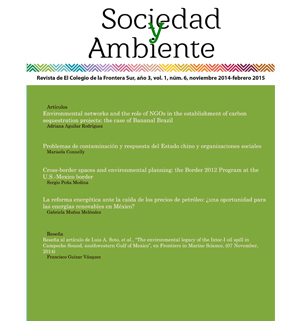Resumen
En este artículo planteo problemas de contaminación del medio ambiente que enfrenta China y que han deteriorado la salud pública y causado un gran malestar entre la población. El gobierno chino ha tomado una serie de medidas para evitar que la contaminación afecte su proyecto de desarrollo económico y social y por ello postuló la construcción de una civilización ecológica. La revisión de la Ley de Protección Ambiental en 2014 fue un logro importante pues trata los puntos que más preocupan a la población: la rendición de cuentas de los funcionarios locales sobre la aplicación efectiva de las leyes ambientales y el castigo a los responsables de contaminar el ambiente. Asimismo, explico el surgimiento de las Organizaciones No Gubernamentales en China, el trabajo realizado por las organizaciones que se dedican al cuidado del medio ambiente y fomentan la participación de la población en la protección del medio ambiente, que a pesar de las restricciones que enfrentan, están luchando por la preservación de la ecología.
Citas
Büsgen, Michael (2006). NGOs and the search for Chinese civil society. Environmental Non-Governmental Organizations in the Nujiang campaign, La Haya, Holanda.
Cary, Eve (2011). “China’s Policy Impasse: The case of the Green GDP Initiative”, China Brief, Vol. XI, Núm. 8.
Fewsmith, Joseph, (2001). “Is Political Reform Ahead? Beijing confronts problems facing society and the CCP”, China Leadership Monitor, Núm. 1, Part 1, septiembre.
Ho, Peter (2001). “Greening without conflict? Environmentalism, NGOs and Civil Society in China”, Development and Change, Vol. 32.
Ho, Peter (2008). “Self-imposed censorship and De-Politized Politics in China”, en Peter Ho y Richard Louis, China´s Embedded Activism, Londres, Nueva York. Routlege.
Instituto de Estudios Sociales. Working Paper Series, Núm. 422.
Jing Jung (2000). “Environmental protests in rural China”, en Elizabeth Perry y Mark Selden, eds, Chinese Society, change, conflict and resistance, Londres, Nueva York, Routledge.
Lewis Joanne I. (2013). “China’s environmental diplomacy, climate change, domestic politics and international engagement”, en Rosemary Foot, ed, China across the divide: the domestic and global politics and society, Oxford, Oxford University Press, 2013.
Li Siliang (2008). “The effectiveness of environmental protests in China: a study of 53 cases”. Universidad de Ciencia y Tecnología de Hong Kong, tesis de maestría.
Lora Wainwright, Anna (2013). “Introduction, dying for development: Pollution, illness and the limits of Citizen’s agency in China”, The China Quarterly, Vol. 214.
Ma Qiusha (2002). “The governance of ONGs in China since 1978: How much autonomy?, non Profit and Voluntary Sector Quarterly, Vol. 31, Núm. 3.
Ma Qiusha (2006). Non-Governmental Organizations in Contemporary China, paving the way to civil society?, Londres, Nueva York, Routledge.
Pan Yue (2004). Huaying baohu yu gongyong canyu (Protección ambiental y participación política), Beijing, China.
Qu Geping y Li Jinchang (1994). Population and the environment in China, Boulder, Co, Lynne Rienner Publishers.
Saich, Tony (2000). “Negotiating the State: The development of social organizations in China”, The China Quarterly, Núm. 161.
Salmenkari, Taru (2014). “Encounters between Chinese NGOs and the state: Distance Roles and Voice”, Issues and Studies, Vol. 50, Núm. 2.
Schwartz, Jonathan (2004). “Environmental NGO’s in China: Roles and limits”, Pacific Affairs, Vol. 77, Núm. 1.
Shapiro, Judith (2001). Mao’s war against nature. Politics and the environment in revolutionary China, Cambridge, Mass, Cambridge University Press.
Shieh, Shawn (2003). “Mapping the dynamics of civil society in China: a model analysis of trends in the NGO sector”. Forum on NGO governance and management in China, Edmonton, Canadá.
Tang, Shui-yan y Xieyong Zhan (2008). “Civil environmental NGOs, civil society, and democratization in China”, Journal of Developmental Studies, Vol. 44, Núm. 3.
Tao, Fu (2007). “Development of NGOs in China”, en Liang Congjie y Dongping Yang,
The China Environmental Yearbook, 2005: Crisis and Breakthrough of China’s Environment, Boston, Brill.
United Nations, http://www.un.org/climatechange/summit/
Whiting, Susan H. (1991). “The politics of NGO Development in China”, Voluntas, Vol. 2, Núm. 2.
Wu Fengshi (2013). “Environmental activism in provincial China”, Journal of Environmental Policy and Planning, Vol. 15, Núm. 181.
Xu Xing y Zhao Litao (2010). “China’s rapidly growing Non-Governmental Organizations”, EIA Background Brief, Núm. 514.
Yan, Katy (2011). “Wang Yongchen, a warrior for China´s free flowing rivers”, World River Review, Vol. 26, Núm. 1.
Yang Guobing (2005). “Environmental NGOs and Institutional Dynamics in China”, The China Quarterly, Núm. 181.
China Daily, Beijing, China, 19 de abril de 2007.
Renmin Ribao, Beijing China, 12 de noviembre de 2008
Renmin Ribao, Beijing, China, 26 de noviembre de 2009.
Spiegel on line International, Andreas Lorenz, “Interview with China´s Deputy Minister of the Environment”, traducido del alemán por Patrick Kessler, 10 de Agosto de 2005. http://www.spiegel.de/international/spiegel/interview-with-china-s-deputy-minister. Consultado 20 de julio 2013.
Xinhua, Beijing, China, 5 de marzo de 2013.

Sociedad y Ambiente cuenta con una licencia Creative Commons Atribución/Reconocimiento-NoComercial-CompartirIgual 4.0 Internacional

